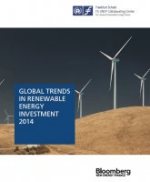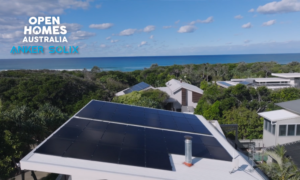Renewables excluding large hydro accounted for 43.6% of 2013’s newly-installed electricity generating capacity says a new report from the Frankfurt School-UNEP Collaborating Centre.
Compiled in partnership with Bloomberg New Energy Finance; Global Trends in Renewable Energy Investment 2014 states non-hydro renewables raised its share of total generation worldwide from 7.8% to 8.5% last year. The report acknowledges carbon dioxide emissions savings of 1.2 billion tonnes as a result.
Cost reductions and efficiency improvements enabled onshore wind and solar PV projects to be constructed in an increasing number of locations around the world last year without the support of subsidies.
While investment in renewable energy capacity including hydro was below gross investment in fossil-fuel power ($227 billion compared to $270 billion), it was roughly double the net figure for investment in fossil-fuel power excluding replacement plant. Cost reductions also need to be factored in; i.e. each dollar is buying more solar and wind capacity.
After years of pressure on clean energy stocks that saw share prices plummet a total of 78%, a strong rally during 2013 saw 96 clean energy stocks worldwide tracked by WilderHill New Energy Global Innovation Index (NEX) gain 54%.
“Lower costs, a return to profitability on the part of some leading manufacturers, the phenomenon of unsubsidised market uptake in a number of countries, and a warmer attitude to renewables among public market investors, were hopeful signs after several years of painful shake-out in the sector,” states the report’s executive summary.
In Australia, clean energy investment also flatlined; but it wasn’t just the cost of renewables coming down responsible. According to the Clean Energy Council’s Kane Thornton, policy uncertainty has played a role.
Global Trends in Renewable Energy Investment 2014 key findings can be viewed in full here (PDF).
The Frankfurt School – UNEP Collaborating Centre for Climate & Sustainable Energy Finance is a strategic cooperation between Frankfurt School of Finance & Management and the United Nations Environment Programme.














































